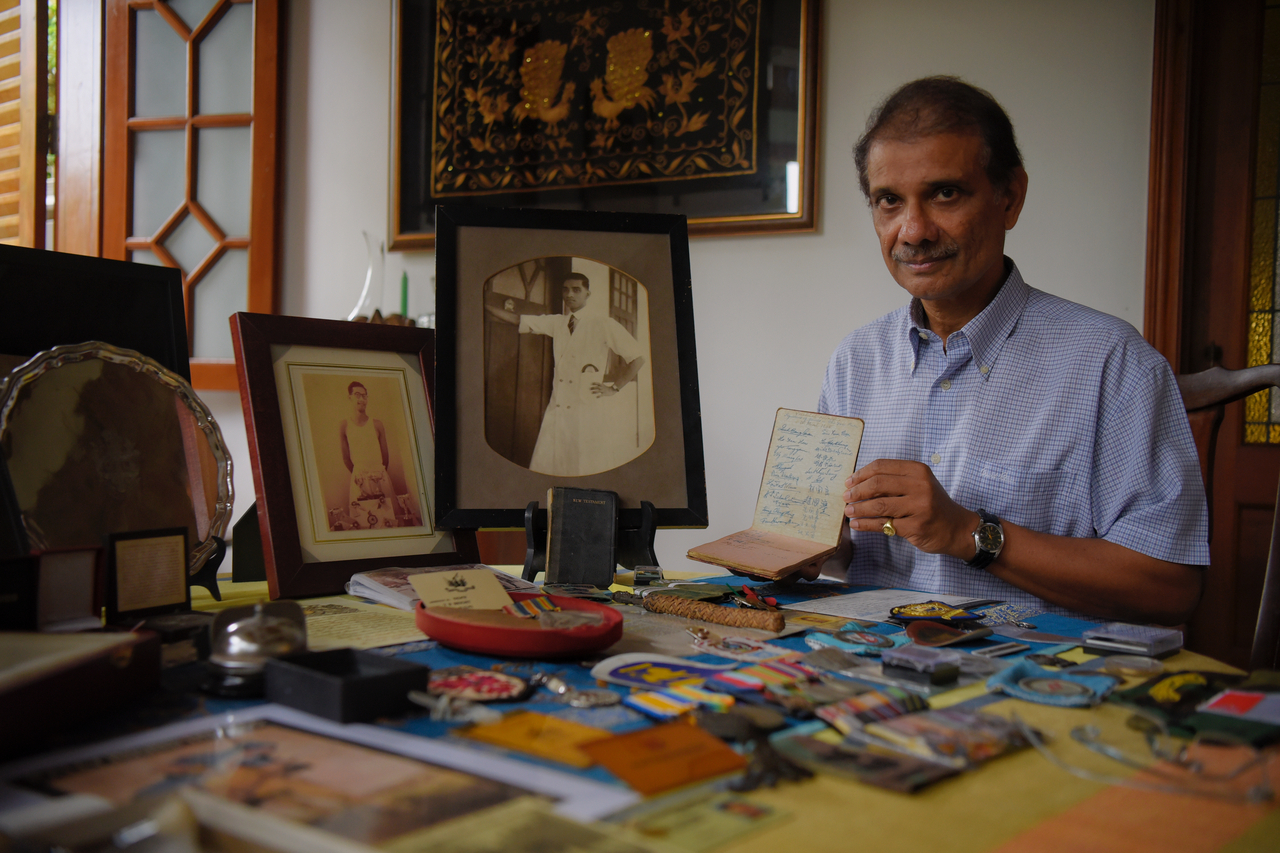Doctor tapped 2 books to maintain hope and faith during Japanese Occupation
Sign up now: Get ST's newsletters delivered to your inbox

Dr James Mark Jeyasebasingam Supramaniam's son Paul Supramaniam holds an autograph book which his late father, who was a World War II survivor, kept throughout his life.
ST PHOTO: MARK CHEONG
Follow topic:
SINGAPORE - Throughout World War II, Dr James Mark Jeyasebasingam Supramaniam carried two books with him - the New Testament of the Bible and an autograph book.
The two books would come to tell the story of how the career medical doctor and civil servant survived the war.
They have remained carefully preserved by his son, lawyer Paul Supramaniam, almost 77 years now after the Japanese surrender in September 1945.
The autograph book bears a collection of signatures and messages from various people in English, Chinese and Tamil - some remembering the dead, but others expressing friendship, faith and hope for the future.
The names reflect Singapore's major ethnic groups, along with a couple of British names and even Japanese ones.
The messages captured in the book give insight into how people coped in the face of uncertainty and danger, the younger Supramaniam, 64, told The Straits Times.
"The book and the messages tell the story of the essence of Singapore - a strong survival instinct, our ability to come together during adversity.
"These were statements written by people who did not know if they were going to last the day. But what comes across very strongly is that besides their insecurities, they talk about hope for a better future."
He added: "More than statues or monuments, the written word speaks and makes the history real and present."

The messages captured in the book give insight into how people coped in the face of uncertainty and danger, Paul Supramaniam said.
ST PHOTO: MARK CHEONG
The other book his dad carried around was given to him by his own father - Methodist minister, Reverend James Arumugam Supramaniam - and was in his pocket the day he was injured by a Japanese artillery shell in 1942.
A 21-year-old medical student at the time, Dr Supramaniam had volunteered for the British Medical Auxiliary Service in the fight against the Japanese.
On Feb 14, he and other medical students had gone out to bury a friend when they were attacked by Japanese troops - possibly because they were mistaken for soldiers, said Mr Supramaniam.
Two of his fellow students died and Dr Supramaniam had a hole blown through one of his legs.
He recovered, and during the Japanese Occupation from Feb 15, 1942, to Sept 12, 1945, Dr Supramaniam was forced to work with the Japanese medical research unit Oka 9420, notes in the autograph book reveal.

Some belongings of Paul Subramaniam’s late father.
ST PHOTO: MARK CHEONG
However, he continued to resist and smuggled medical supplies to prisoners of war and hospitals that needed them.
After the war, he was given medals for his service by the British, many of which have been gifted by Mr Supramaniam to the Indian Heritage Centre.
Dr Supramaniam went on to have a long career in the civil service - holding posts such as deputy permanent secretary for health and chairman of the Civil Aviation Medical Board.
He also pioneered research in the treatment of tuberculosis, while also continuing to practise as a medical doctor in various hospitals here.
A book was written about his life and career in 2019 titled: He Saved Thousands: The Story Of Dr JMJ Supramaniam. He died in 2008 at the age of 87.
His elder brother, Dr George Supramaniam, did not survive the war. He died in 1944 in Kuching, Sarawak, after the Japanese refused him treatment for beri beri.

A picture and stethoscope belonging to Paul Subramaniam’s late uncle, who passed away during World War II.
ST PHOTO: MARK CHEONG
Showing The Straits Times a picture of his uncle, Mr Supramaniam said: "The price of defence is losing people, but the price of not being able to defend yourself is far more.
"As accomplished as he was, my father used to say my uncle George was much more intelligent and talented than he was. Imagine how many people, how much talent like him we lost."
Correction note: An earlier version of this article said Dr Supramaniam was the acting deputy permanent secretary for health. This has been corrected. We are sorry for the error.

